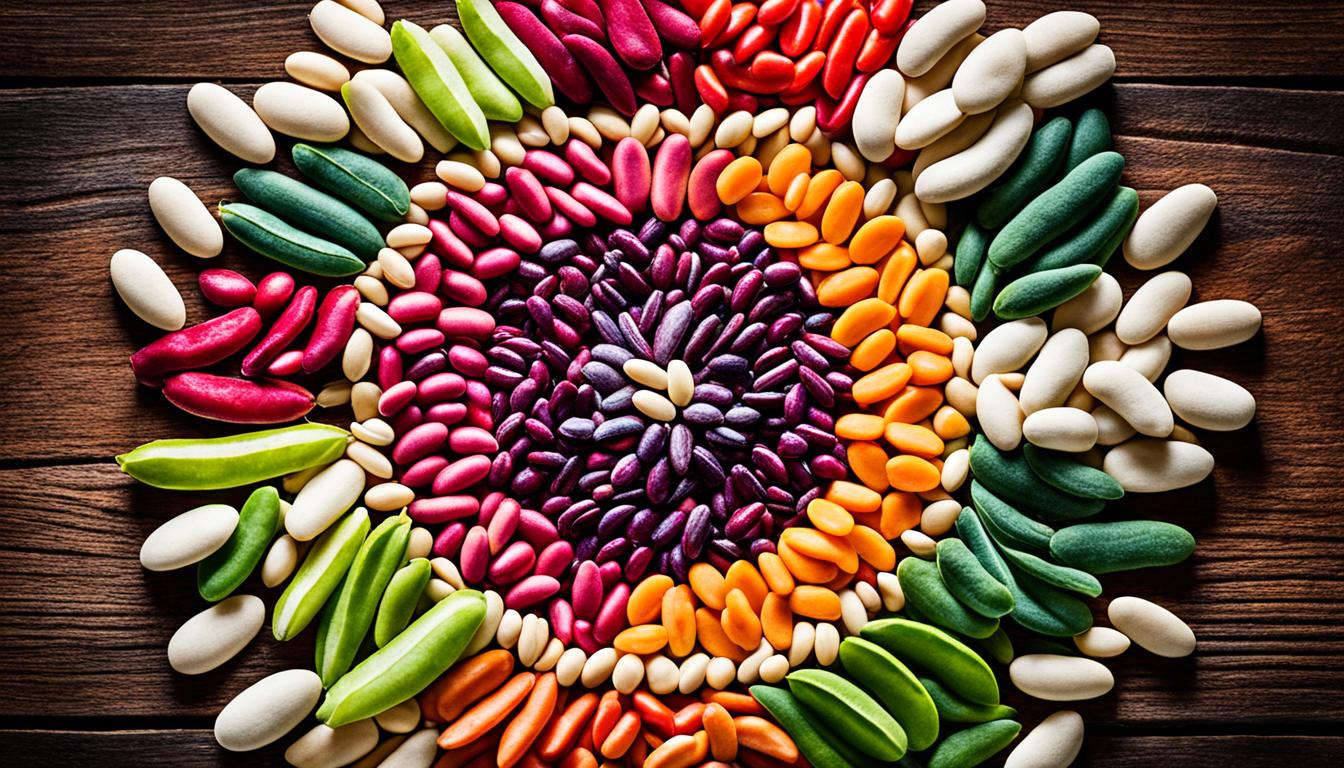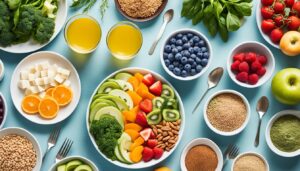Great Northern beans are incredibly versatile and nutritious. These beans are more than just a tasty part of your meals. They bring many health benefits, making them great for a well-rounded diet.
Key Takeaways:
- Great Northern beans are a versatile and nutritious legume.
- They offer numerous health benefits and are a valuable source of protein.
- Include Great Northern beans in your meals for heart health, digestive health, and weight management.
- Experiment with different recipes and cooking methods to enjoy the versatility of these legumes.
- Whether using canned or dried beans, Great Northern beans are easy to prepare and incorporate into your diet.
Rich in Plant-Based Protein
Great Northern beans are packed with protein. They’re perfect for vegetarians, vegans, and those cutting down on meat.
A single cup of these beans has around 15 grams of protein. This helps with muscle growth and keeping your body healthy.
If you’re looking to boost your plant-based protein, Great Northern beans are ideal. They’re nutritious and tasty. Plus, they fuel muscle growth and body repair.
Studies show plant proteins are as good as those from animals for muscles. Adding Great Northern beans to your diet is smart. It fulfills your protein needs, especially if you’re avoiding meat.
Fiber-Rich for Digestive Health
Great Northern beans are packed with dietary fiber. They are good for your diet. They help promote digestive health. Fiber is key for regular bowel movements. It prevents constipation and supports a healthy gut.
Eating Great Northern beans ensures you meet your daily fiber needs. This supports your digestive system.
Dietary fiber helps you stay regular and feel full. This is great for managing your weight. It lowers your calorie intake. Great Northern beans make your diet healthy and balanced.
It’s easy to add Great Northern beans to your meals. They make dishes like soups, stews, salads, and casseroles tasty and nutritious.
“Fiber is vital for digestive health and wellbeing. Great Northern beans aide regularity, promote fullness, and help manage weight.”
The Benefits of Dietary Fiber:
- Promotes regular bowel movements
- Prevents constipation
- Supports a healthy gut microbiome
- Contributes to feelings of fullness and satiety
- Aids in weight management
Great Northern beans bring the power of dietary fiber. They boost your digestive health and overall well-being.
| Fiber Content | Amount per Serving (1 cup, cooked) |
|---|---|
| Total Dietary Fiber | 16 grams |
| Insoluble Fiber | 11 grams |
| Soluble Fiber | 5 grams |
Heart-Healthy Nutrients
Great Northern beans are full of heart-healthy nutrients. These nutrients are great for your heart. They are loaded with potassium which helps keep blood pressure in check. This reduces your risk of hypertension and stroke. Additionally, these beans have folate, a vital B-vitamin. Folate lowers homocysteine levels, a risk factor for heart disease.
Adding Great Northern beans to your meals is a smart move for your heart. This can lower your chances of facing cardiovascular issues.
The potassium in Great Northern beans helps manage blood pressure. This is key for a healthy heart. Potassium relaxes the walls of your blood vessels. This makes blood flow easier, easing the heart’s workload. You can enhance your heart health by eating these beans.
“Great Northern beans provide a good amount of fiber, potassium, and folate, which are all essential for maintaining a healthy heart.”
Folate also plays a role in minimizing heart disease risks. It does this by lowering homocysteine in the blood. High levels of homocysteine can hurt blood vessels and up the risk of clots. Ensure you get enough folate by eating Great Northern beans to support your heart.
| Heart-Healthy Nutrients in Great Northern Beans | Health Benefits |
|---|---|
| Potassium | Regulates blood pressure, reduces the risk of hypertension and stroke |
| Folate | Lowers homocysteine levels, decreases the risk of heart disease |
Eating Great Northern beans regularly is a great way to protect your heart. You’ll gain from the heart-healthy nutrients they provide, improving your cardiovascular health.
Nutrient-Dense and Low in Calories
Great Northern beans are packed with nutrition and are great for your health. They are tasty, full of important nutrients, and low in calories. This makes them a perfect choice for anyone looking to eat healthily. Most processed foods offer little nutritional value and are high in empty calories. But, Great Northern beans provide essential nutrients that keep you healthy.
Eating Great Northern beans can help you maintain a healthy weight. These beans are low in calories, so eating them won’t lead to weight gain. They also deliver a variety of important nutrients in each serving. This helps meet your body’s needs while controlling calorie intake.
Great Northern beans contain plenty of protein, fiber, vitamins, and minerals. These nutrients are key for good health. Protein helps with muscle growth and repair. Fiber supports digestion and keeps your gut healthy.
Adding Great Northern beans to your diet gives you important nutrients without too many calories. They are an excellent choice whether you want to keep a healthy weight or just improve your diet.
The Nutritional Profile of Great Northern Beans
Let’s examine what makes Great Northern beans so nutritious.
| Nutrient | Amount per 1 cup (cooked) |
|---|---|
| Protein | 15 grams |
| Fiber | 13 grams |
| Vitamin C | 5% of the Daily Value (DV) |
| Vitamin A | 0% of the DV |
| Calcium | 8% of the DV |
| Iron | 15% of the DV |
Great Northern beans are full of protein and fiber, crucial for a healthy diet. They also have key minerals like calcium and iron. These are important for strong bones and preventing anemia.
Great Northern beans are nutritious and don’t have many calories. They are a tasty way to stay healthy and manage your weight. Adding them to your meals supports your health.
Versatile and Easy to Prepare
Great Northern beans are super versatile in the kitchen. You can use them in many dishes, like soups, salads, and desserts. They bring texture, flavor, and nutrition to your food.
Want some ideas on how to use Great Northern beans? Here you go:
1. Creamy White Bean Dip
Make a tasty dip by blending these beans with olive oil, lemon juice, garlic, and any herbs you like. It’s great with veggies or crackers.
2. Hearty Bean Soup
For a warm soup, mix the beans with broth, veggies, and herbs. Add diced ham or sausage for more taste, or keep it vegetarian.
3. Bean and Kale Salad
Mix the beans with kale, tomatoes, cucumbers, and a tasty dressing for a healthy salad. Add feta cheese or nuts on top for extra flavor.
4. Beans in Casseroles
Putting Great Northern beans in casseroles adds protein and fiber. They go well with chicken, veggies, and cheese.
5. Sweet Bean Desserts
Yes, you can make desserts with Great Northern beans! Blend them with cocoa, honey, and vanilla for a chocolate mousse. Or put mashed beans in brownies or cookies for moisture and health benefits.
Great Northern beans are simple to add to your meals. Use canned beans for quickness or dried beans for economy. Soak dried beans overnight to cook faster and get a soft texture.
| Bean Preparation Method | Cooking Time | Yield |
|---|---|---|
| Using Canned Beans | N/A | Depends on the can size |
| Cooking Dried Beans | 1-2 hours, plus soaking time | Approximately 2.5 cups of cooked beans per cup of dried beans |
Explore the kitchen with Great Northern beans. They’re a great addition to any meal with their taste and nutritional benefits. Whether you’re an expert or a beginner, these beans are a great choice.
Health Benefits of Great Northern Beans
Great Northern beans taste great and are healthy for you. They help with heart and digestive health, assist in weight control, and are a good source of protein.
Supporting Heart Health
Great Northern beans are good for your heart. They have potassium and folate, which keep your heart working well. Potassium helps keep blood pressure low, which means less risk of heart problems. Folate lowers homocysteine, an amino acid that could increase heart disease risk.
Promoting Digestive Health
These beans are full of fiber, which is great for your stomach. Fiber helps you go to the bathroom regularly and stops constipation. It also keeps your gut healthy. Adding these beans to your diet makes your digestive system work better.
Aiding in Weight Management
Great Northern beans are perfect for staying in shape. They are low in calories and make you feel full, which helps you eat less. The protein in the beans also helps your muscles grow and repair. This makes them great for keeping a healthy weight.
Eating Great Northern beans is a smart choice. They offer protein, key nutrients, and lots of fiber. Whether you want to improve your heart health, digestion, or weight, or just feel better overall, these beans are a great option.
| Health Benefits | Description |
|---|---|
| Heart Health | Great Northern beans provide potassium and folate, which support blood pressure regulation and reduce the risk of heart disease. |
| Digestive Health | The high dietary fiber content of Great Northern beans promotes healthy digestion, regular bowel movements, and a balanced gut microbiome. |
| Weight Management | Being nutrient-dense and low in calories, Great Northern beans contribute to satiety, aiding in weight management goals. |
| Protein Source | Great Northern beans are a rich plant-based protein source, making them an excellent choice for vegetarians and vegans. |
Incorporating Great Northern Beans Into Your Diet
Great Northern beans are perfect for many dishes, adding flavor, texture, and nutrition. They are great for any cooking level. You can find many ways to use these beans in your meals.
Looking for recipes, cooking ideas, and meal inspiration with Great Northern beans? Look no further!
Cooking Ideas
Here are some ways to use Great Northern beans in your cooking:
- Add them to soups and stews. They make meals like minestrone and chili richer and more nutritious.
- Mix them into salads. They add protein and fiber, making salads more filling.
- Make dips and spreads. Blend them with herbs and spices for a tasty snack.
- Try them in main dishes. They can be the main ingredient in burgers and casseroles.
These ideas can help you enjoy Great Northern beans in various meals. Be creative and enjoy your time in the kitchen!
Recipe Inspiration
Looking for recipes? Here are some tasty ones with Great Northern beans:
| Recipe | Description |
|---|---|
| White Bean and Kale Soup | A cozy soup with Great Northern beans, kale, and herbs. |
| Three Bean Salad | A tasty salad with three types of beans and a tangy dressing. |
| Bean and Vegetable Casserole | A hearty casserole with beans, veggies, and cheese. |
| White Bean Hummus | A creamy dip with beans, tahini, and lemon. Great for parties. |
Feel free to change these recipes as you like. They’re just starting points.
“Great Northern beans are great for many dishes. They have a creamy texture and mild flavor. They match well with different ingredients. Don’t be afraid to try new things in the kitchen. It’s good for your taste buds and health. “
Have fun and experiment with flavors and cooking methods. Great Northern beans can make your meals both healthy and enjoyable.
Buying and Storing Great Northern Beans
There are two types of Great Northern beans to buy: dried or canned. Your choice depends on your taste and health needs.
Dried beans let you adjust their texture and taste better. You have to soak and cook them before eating, though. If you love making meals from scratch, dried beans are a good fit.
Canned beans save you time. They’re ready to eat right out of the can. But, they might have extra salt or preservatives. Always check the labels to make sure they meet your diet requirements.
To keep dried beans fresh, store them in a cool, dry spot like a pantry. Canned beans also go in the pantry until opened. After opening, place leftover canned beans in a sealed container in the fridge.
Both dried and canned Great Northern beans are nutritious and flexible in recipes. Pick what works best for you. This way, you can easily add them to your dishes.
Tips for Buying and Storing Great Northern Beans:
- Look at labels for salt or preservatives.
- Only buy as many dried beans as you can use to keep them fresh.
- Think about your budget and how much storage room you have.
- Follow the package directions to soak and cook dried beans well.
- Use airtight containers for storing dried beans to keep out moisture and bugs.
Potential Side Effects and Allergies
Most people can eat Great Northern beans without problems. However, some might have side effects or allergies. It’s key to know these possibilities.
Beans, like Great Northern beans, might cause gas and tummy trouble. This happens because of the sugars and fibers in beans. Some folks find these hard to digest.
If eating these beans gives you bloating or gas, don’t worry. You can soak and rinse the beans before cooking. This lowers the hard-to-digest compounds.
Also, try cooking beans with kombu seaweed or cumin. These can help break down the troublesome sugars and fibers. This method might ease digestive discomfort.
If you are allergic to legumes, including Great Northern beans, steer clear of them. Allergies can be mild, like itching, to severe, like breathing problems or anaphylaxis.
If you’re bothered by beans or think you’re allergic, talk to a healthcare pro. It’s important to get advice if symptoms keep up after eating beans or other legumes.
| Side Effects | Allergies |
|---|---|
|
|
Conclusion
Great Northern beans are amazing for both taste and health. They are full of protein and fiber. This makes them perfect for building muscles, helping digestion, and controlling weight. Their nutrients are good for the heart and they don’t have many calories, making them a great food choice.
These beans are also very flexible in cooking. You can use them in many dishes, like soups, salads, and even desserts. They add a creamy texture and a mild flavor that makes any meal better. You can easily cook them, whether you use canned beans or start with dried ones. Adding these beans to your dishes brings more flavor and health benefits.
Adding Great Northern beans to your food is a great idea. They’re good for chefs or anyone just starting to cook. By using these beans, you can make your meals healthier and tastier. So, why not try some new recipes with Great Northern beans? See what great dishes you can create with these adaptable beans.
FAQ
Are Great Northern beans a good source of protein?
How do Great Northern beans promote digestive health?
What nutrients in Great Northern beans support heart health?
Are Great Northern beans nutrient-dense but low in calories?
How can I incorporate Great Northern beans into my meals?
Should I buy dried or canned Great Northern beans?
Do Great Northern beans have any side effects?
Source Links
- https://nutrivore.com/foods/great-northern-bean-nutrients/
- https://be-still-farms.com/blogs/healthy-organic-living-blog/health-benefits-of-great-northern-beans-a-nutritional-powerhouse
- https://be-still-farms.com/blogs/healthy-organic-living-blog/great-northern-beans-a-tasty-and-protein-packed-addition-to-your-diet





